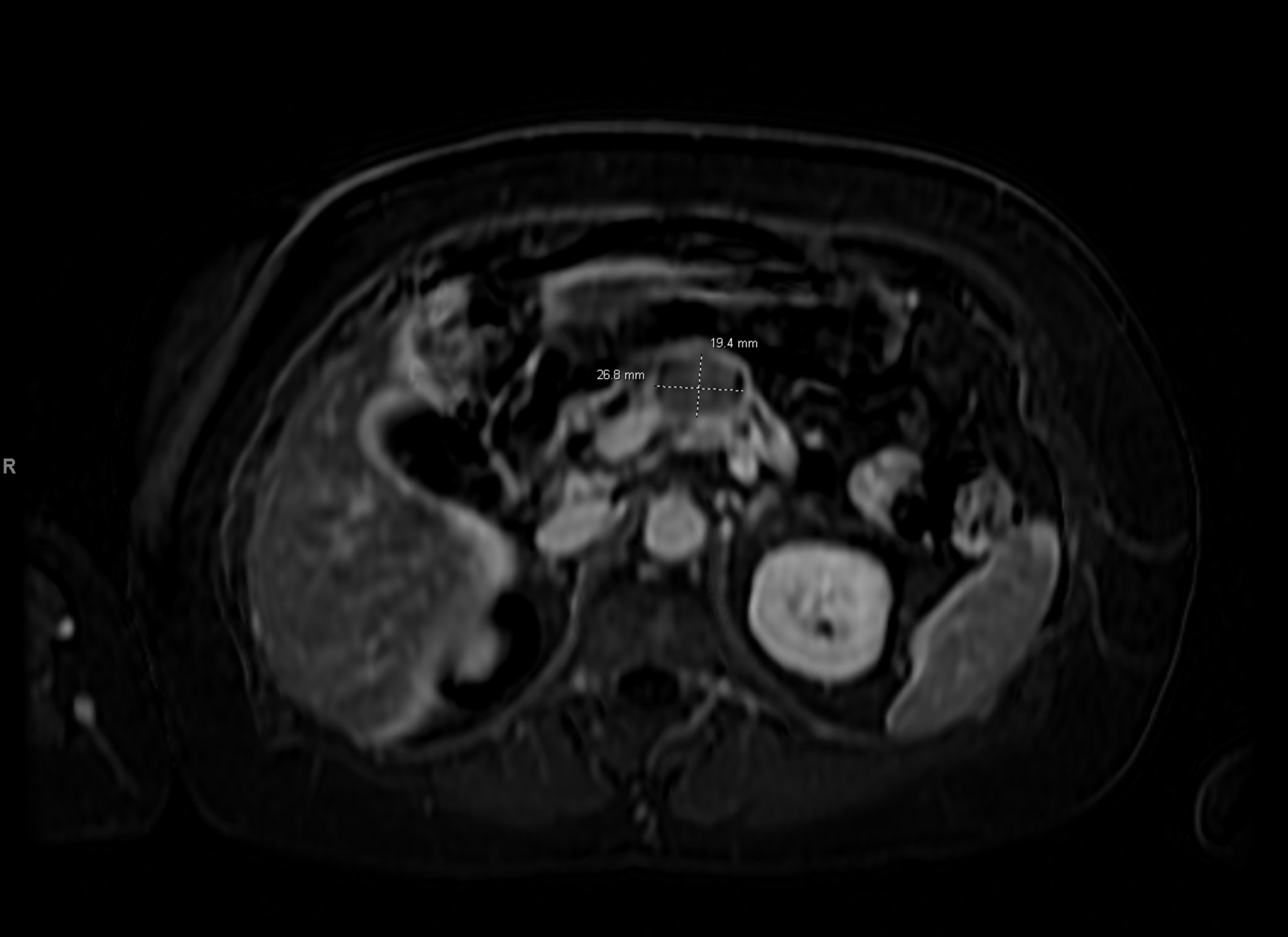Monday Poster Session
Category: Biliary/Pancreas
P2261 - A Case Report of Undifferentiated Carcinoma of the Pancreas with Osteoclast-Like Giant Cells
Monday, October 27, 2025
10:30 AM - 4:00 PM PDT
Location: Exhibit Hall
- YO
Yesol Oh, MD
Wright State University
Dayton, OH
Presenting Author(s)
William Jevnikar, MS1, Urmimala Chaudhuri, DO2, Yesol Oh, MD1, Anna Moore, MD1
1Wright State University, Dayton, OH; 2Wright State University, Centerville, OH
Introduction: Undifferentiated carcinoma with osteoclast-like giant cells (UCOGCs) is a subtype of pancreatic undifferentiated carcinoma (UC), a rare type of pancreatic malignancy. Prognosis for pancreatic UC is typically worse than for conventional ductal adenocarcinoma, although early detection and absence of metastasis are associated with better outcomes. We present a case of an 81-year-old female with incidental, non-metastatic, pT2N0 stage Ib pancreatic UCOGCs.
Case Description/
Methods: An 81 year-old female with past medical history of type 2 diabetes mellitus, hypertension, and chronic kidney disease presented to her primary care provider with complaints of persistent right lower quadrant pain in the absence of weight loss, change in bowel habits or stool consistency. Computed tomography (CT) imaging revealed no clear cause for the pain but identified an incidental, well-demarcated 2.8 cm mass within the pancreatic body with upstream ductal dilation. Abdominal magnetic resonance imaging (MRI) confirmed a primary pancreatic neoplasm (Figure 1). Tumor marker CA 19-9 was normal, and staging CT chest showed no metastasis. Endoscopic ultrasound demonstrated a round, well-demarcated hypoechogenic pancreatic body mass causing ductal dilation with an atrophic pancreatic tail. Fine needle aspiration of the mass demonstrated spindle cells suspicious for malignancy. She was referred for surgical resection.
The patient underwent an uncomplicated robotic-assisted distal pancreatectomy with splenectomy. Pathology showed high-grade pleomorphic and bizarre uninuclear neoplastic cells along with multinucleated giant cells. Immunostaining was positive for CK7, CK AE1/3, CD68 and CD163 with retained nuclear expression of DPC4, findings consistent with pancreatic UCOGCs. The patient was referred to medical oncology and started on gemcitabine/capecitabine-based systemic adjuvant chemotherapy following negative staging scans.
Discussion: Although pancreatic UCOGCs are increasingly recognized, long-term treatment options remain limited. Currently, surgical resection is considered the mainstay of treatment. In this case, adjuvant chemotherapy was elected following peer review at a leading center, which recommended treating pT2N0 stage Ib pancreatic UCOGCs similar to pancreatic adenocarcinoma. Given the rarity of UCOGCs and the lack of disease-specific protocols, there is growing need for further long-term studies to optimize therapeutic strategies and improve patient outcomes.

Figure: Figure 1. T2 hypointense solid hypoenhancing mass within the pancreatic body measure 1.9 x 2.7 cm with mild diffusion restriction
Disclosures:
William Jevnikar indicated no relevant financial relationships.
Urmimala Chaudhuri indicated no relevant financial relationships.
Yesol Oh indicated no relevant financial relationships.
Anna Moore indicated no relevant financial relationships.
William Jevnikar, MS1, Urmimala Chaudhuri, DO2, Yesol Oh, MD1, Anna Moore, MD1. P2261 - A Case Report of Undifferentiated Carcinoma of the Pancreas with Osteoclast-Like Giant Cells, ACG 2025 Annual Scientific Meeting Abstracts. Phoenix, AZ: American College of Gastroenterology.
1Wright State University, Dayton, OH; 2Wright State University, Centerville, OH
Introduction: Undifferentiated carcinoma with osteoclast-like giant cells (UCOGCs) is a subtype of pancreatic undifferentiated carcinoma (UC), a rare type of pancreatic malignancy. Prognosis for pancreatic UC is typically worse than for conventional ductal adenocarcinoma, although early detection and absence of metastasis are associated with better outcomes. We present a case of an 81-year-old female with incidental, non-metastatic, pT2N0 stage Ib pancreatic UCOGCs.
Case Description/
Methods: An 81 year-old female with past medical history of type 2 diabetes mellitus, hypertension, and chronic kidney disease presented to her primary care provider with complaints of persistent right lower quadrant pain in the absence of weight loss, change in bowel habits or stool consistency. Computed tomography (CT) imaging revealed no clear cause for the pain but identified an incidental, well-demarcated 2.8 cm mass within the pancreatic body with upstream ductal dilation. Abdominal magnetic resonance imaging (MRI) confirmed a primary pancreatic neoplasm (Figure 1). Tumor marker CA 19-9 was normal, and staging CT chest showed no metastasis. Endoscopic ultrasound demonstrated a round, well-demarcated hypoechogenic pancreatic body mass causing ductal dilation with an atrophic pancreatic tail. Fine needle aspiration of the mass demonstrated spindle cells suspicious for malignancy. She was referred for surgical resection.
The patient underwent an uncomplicated robotic-assisted distal pancreatectomy with splenectomy. Pathology showed high-grade pleomorphic and bizarre uninuclear neoplastic cells along with multinucleated giant cells. Immunostaining was positive for CK7, CK AE1/3, CD68 and CD163 with retained nuclear expression of DPC4, findings consistent with pancreatic UCOGCs. The patient was referred to medical oncology and started on gemcitabine/capecitabine-based systemic adjuvant chemotherapy following negative staging scans.
Discussion: Although pancreatic UCOGCs are increasingly recognized, long-term treatment options remain limited. Currently, surgical resection is considered the mainstay of treatment. In this case, adjuvant chemotherapy was elected following peer review at a leading center, which recommended treating pT2N0 stage Ib pancreatic UCOGCs similar to pancreatic adenocarcinoma. Given the rarity of UCOGCs and the lack of disease-specific protocols, there is growing need for further long-term studies to optimize therapeutic strategies and improve patient outcomes.

Figure: Figure 1. T2 hypointense solid hypoenhancing mass within the pancreatic body measure 1.9 x 2.7 cm with mild diffusion restriction
Disclosures:
William Jevnikar indicated no relevant financial relationships.
Urmimala Chaudhuri indicated no relevant financial relationships.
Yesol Oh indicated no relevant financial relationships.
Anna Moore indicated no relevant financial relationships.
William Jevnikar, MS1, Urmimala Chaudhuri, DO2, Yesol Oh, MD1, Anna Moore, MD1. P2261 - A Case Report of Undifferentiated Carcinoma of the Pancreas with Osteoclast-Like Giant Cells, ACG 2025 Annual Scientific Meeting Abstracts. Phoenix, AZ: American College of Gastroenterology.

